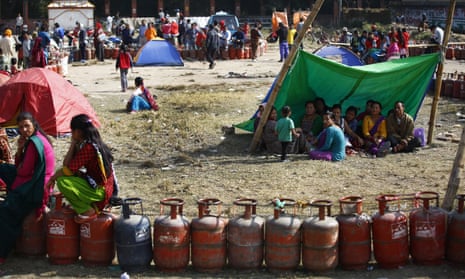Unicef has cautioned that the blockade of Nepal’s border posts with India “threatens the future of the country itself”.
The stark warning from the UN children’s agency, which echoes sentiments expressed by Nepal’s deputy prime minister, Kamal Thapa, earlier this month, follows calls by aid agencies working in the country for an urgent resolution to the crisis.
“First, there was a devastating act of nature – the earthquakes that took and damaged so many lives,” said Anthony Lake, the executive director of Unicef, during a recent visit to the country. “Now, political differences among human beings are dealing new blows to the children of Nepal.”
The crisis centres on opposition to Nepal’s new constitution, signed on 20 September. Although the charter was passed by a large majority of MPs, members of the ethnic Madhesi political parties boycotted the vote, claiming the constitution failed to guarantee them fair representation in parliament and public office.
Since August, Madhesi political parties have imposed a general strike across much of the Terai, the southern plains that run the length of Nepal’s border with India. Public transport and health services have been severely disrupted and many factories and schools have been closed for months. Unicef estimates that more than 1.5 million children are out of school in the Terai region alone.
Devendra Lal Karna, a secondary school principal in Danusha district in the Terai, said some of his students were being used in the protests and demonstrations. “This whole situation will have a long-term negative impact on them,” he said. “We survived the earthquake that forced us to shut schools down, then came the strike. It’s been a very bad year for us.”
Soon after the constitution was agreed in September, the protests were stepped up as demonstrators blocked border posts with India, including the main entry point at Birgunj, a town about 135km south of the capital, Kathmandu. The blockade has led to acute shortages of petrol, cooking gas and other essential supplies.
Oxfam has warned that its humanitarian programme will come to a complete standstill within weeks. Cecilia Keizer, the country director of Oxfam in Nepal, said: “Hospitals have run out of essential drugs and supplies, vital social services have been disrupted and aid agencies have not been able to secure fuel to deliver relief items to prepare people for the winter in earthquake affected districts.”
Dr Swayam Prakash Pandit, the director of Bir hospital in Kathmandu, said the hospital is running low on vital drugs and oxygen cylinders. “We are managing so far but we will run out soon,” he said. “We are having to use firewood to cook food for our patients as we ran out of cooking gas.”
Nepalese politicians are becoming increasingly outspoken about what they see as India’s role in the blockade. On Sunday, the prime minister, Khadga Prasad Sharma Oli, suggested India was to blame for prolonging the blockade, describing it as “inhumane and beyond imagination” according to local media reports.
Some have accused India of siding with the Madhesi, who have close ethnic, cultural and linguistic ties with north India. India has repeatedly denied the allegations.
Ram Sharan Mahat, a former finance minister, said: “India should not use international trade as a tool to influence internal politics … Internal problems should be resolved internally … Nepal’s economy has been badly affected, especially at the time of post-earthquake reconstruction.”
However, efforts to rebuild have been hampered by the government’s failure to establish the national reconstruction authority, the body charged with overseeing the distribution of $4b.1n (£2.7bn) of relief funds promised by the international community shortly after the earthquakes, which struck in April and May.
The World Food Programme has said that the distribution of food supplies to earthquake victims is 20% behind schedule due to the lack of fuel. The organisation’s two helicopters, which had previously been delivering relief materials to about 140,000 survivors at high altitude twice daily, were grounded all of last week. “We are doing our best to help survivors of the earthquake but it is very difficult,” said a spokeswoman for the UN body.
One of the earthquake survivors waiting for relief is Hari Bahadur Bharati, who lives in the hills of Sindhupalchowk district, three hours’ drive north-east of Kathmandu. “We are having a very tough time. We have received just 15,000 rupees [£148], a few sacks of rice and a tarpaulin,” he said. “Since then no one has come to ask about our situation.”
With the onset of winter, Bharati and his family are struggling to sleep at night because of the cold. The fuel shortages have made things worse. “The current crisis has added more pain,” he said. “We are not getting cooking oil, kerosene oil and the price of food has gone sky high … Nothing has changed since the earthquake. The level of pain and difficulty is just getting worse.”
